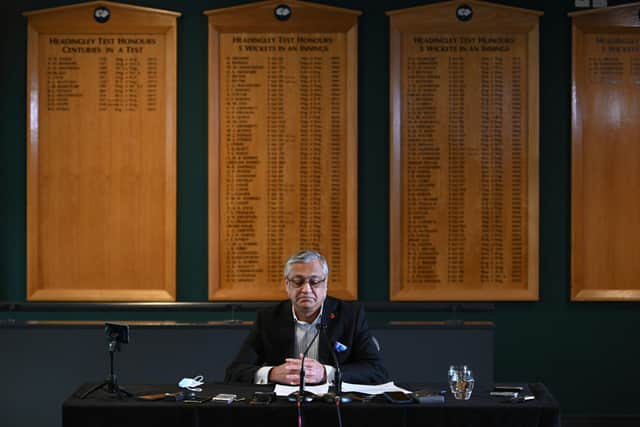Stench of injustice in Yorkshire CCC racism saga will never go away - Chris Waters comment
They make for deeply unsatisfactory reading.
The findings have been widely covered in terms of the headline items: the £400,000 fine for the club (three-quarters of which was suspended pending “any further serious breach of cricketing regulations” in the next two years), the 48-point penalty in the County Championship and the four-point deduction in the T20 Blast, the latter a strange imposition given that the T20 was already over and Yorkshire made no impact in it anyway.
Little or no scrutiny, however, has been applied to the actual charges which Yorkshire accepted in the first place, following an investigation (so-called) by the England and Wales Cricket Board (ECB), and on which the CDC’s punishments are based.
Advertisement
Hide AdAdvertisement
Hide Ad

Amended Charge One – initially there were six charges which Yorkshire and the ECB whittled down to four after discussions between themselves – contained three limbs.
The first limb is one of the most remarkable and under-emphasised elements of the whole saga.
This concerned the allegation that Yorkshire mishandled the initial Squire Patton Boggs (SPB) report they commissioned into claims made by their former player Azeem Rafiq on the basis of a letter signed by then club chairman Roger Hutton to the ECB in October 2021, which rejected the report’s upheld findings.
A month earlier, when those findings were published, Hutton had issued a grovelling public apology to Rafiq, saying that there was “no question” he was “a victim of racial harassment and bullying”. A month later, in his resignation statement, Hutton further cited “a constant unwillingness from the executive members of the board and senior management at the club to apologise and to accept that there was racism”, a stance he reiterated in front of the Digital, Culture, Media and Sport (DCMS) select committee.
Advertisement
Hide AdAdvertisement
Hide Ad

So, on the one hand, Hutton refuted Rafiq’s claims to the ECB and felt that the upheld findings could all be countered/challenged, the prevailing view within the club; on the other, amid an increasingly hysterical climate caused by the actual mishandling of the report, which related to Yorkshire’s heel-dragging and ham-fisted response to it in the face of intense social media and parliamentary pressure, he apologised for them.
Consequently, a deeply unjust and one-sided narrative was allowed to take root with disastrous consequences for a great many people, their reputations and the club, a fallacy that persists to this day. It was on the basis of those disputed SPB findings that the CDC fined Yorkshire £80,000 in respect of Amended Charge One, the second and third limbs of which concerned a failure to take disciplinary action against implicated individuals.
Keep in mind that it was the post-Hutton Yorkshire regime that submitted all the guilty pleas on which the CDC ruled, a regime in which the ECB had a direct and disturbing influence.
For not only did the governing body first of all suspend Yorkshire from staging international cricket on the back of the SPB report, therefore compromising its own investigation at the start, but it also parachuted in its own choice as Hutton’s replacement, Lord Kamlesh Patel, to oversee the reforms that it deemed necessary to lift its own suspension.
Advertisement
Hide AdAdvertisement
Hide Ad

Further, the scope of the CDC was extremely limited, with, as its findings stated, sanctions imposed “solely upon the evidence which each party chooses to advance” – in other words, what the new Yorkshire regime and an ECB with a vested interest in the case wanted to advance.
Given that the SPB investigation was itself flawed (key figures were not interviewed in the club’s support, there was no scope to challenge upheld findings, Hutton was a previous SPB employee, and so on), that the ECB probe then repeated or exacerbated those failings and that the CDC had no investigative remit, we are left with a saga that leaves only a number of open-ended questions, no closure and precious little justice.
Amended Charge Two is like something out of a particularly bad crime novel - the alleged “mass deletion of emails and/or documents and/or log files held electronically within Yorkshire’s possession and/or control relating to Yorkshire’s response to the (SPB) report”.
The charge adds: “It is also alleged that the mass deletion was carried out by persons unknown, on a date unknown, which was discovered in or around November 2021 during the course of the ECB’s investigation into Yorkshire.”
Advertisement
Hide AdAdvertisement
Hide Ad

In its findings, the CDC states categorically: “That this deletion was deliberate is clear.” It introduces, without any context or explanation, a mysterious figure by the name of “Mr Van der Laarschot”, whose firm (unnamed) was commissioned by the Patel regime due to unspecified concerns.
According to the CDC: “His firm discovered that a number of emails had been deliberately deleted from the inbox of then current members of staff” and had “searched the email accounts of those members of staff for key names connected with this investigation - there were no results from these searches… On the balance of probabilities, it (the CDC) is satisfied that the deletions were both deliberate and were of emails relevant to the investigations being undertaken by both the ECB and internally.”
Or, if one might be allowed a crack at rephrasing it, the CDC considers it categorically clear that unknown individuals deliberately deleted unknown emails, the content of which is unknown, at a time unknown, a discovery itself made at an unknown time (“in or around November 2021”) which were clearly relevant to Yorkshire’s response to the SPB report “on the balance of probabilities” because a “Mr Van der Laarschot’s” company says so. Er, I rest my case for the defence, Your Worship.
And yet Yorkshire - willingly presenting their backside for the headteacher’s cane - pleaded guilty and were fined £50,000. It’s a fair cop, M’lud.
Advertisement
Hide AdAdvertisement
Hide AdSo remarkable does this charge seem - to be clear, it implies the serious cover-up of a hate crime with preposterously scanty evidence – that I went to the trouble of emailing Tim O’Gorman, chair of the CDC panel. I asked, given that the CDC was informed that all files would have been backed up on Yorkshire’s IT servers, whether the CDC was satisfied that the alleged deleted material was therefore not backed up and permanently irretrievable? If so, I wondered to what extent the CDC had gone to establish this fact?
I have not received a reply.
I also asked if Mr O’Gorman could clarify point 89 of the CDC findings, headed “Racism as a motive for the admitted conduct”. This intriguing paragraph reads: “It is submitted that the nature of the amendments to the charges which the club has admitted reflect the fact that YCCC’s failings were not themselves racially motivated or tainted. In light of the fact that the ECB accepts this and agrees the amendments to the charges, the panel must accept this proposition.”
Although the wording is opaque, perhaps purposely, it would seem to suggest that Yorkshire’s conduct in respect of all charges related to the Rafiq affair was not considered by the ECB to be racially motivated or tainted, in which case what was everyone doing there and what about the implications for the wider accusation that the club itself was institutionally racist?
Again, I have not received a reply.
Amended Charge Three concerns Yorkshire’s alleged failure to take adequate action following Rafiq’s complaints of racism shortly before he lost his contract in 2018, and also complaints of racism by spectators at Yorkshire home games.
Advertisement
Hide AdAdvertisement
Hide AdThe CDC implies that Rafiq’s complaints were specific, whereas those to whom he complained told ECB investigators that the complaints were vague, buried within a much broader range of accusations primarily concerning what he considered to be ill-treatment by the club following the loss of his still-born son; that Yorkshire did, in fact, offer to investigate and that Rafiq himself declined that offer.
As for complaints by spectators, the CDC again falls back on the disputed SPB report, which is once more understood to have failed to interview key staff. On this charge, Yorkshire were fined £135,000.
Ditto for Amended Charge Four – that they failed to address systemic use of racist or discriminatory language over a prolonged period, a charge contradicted by the witness statements of various Asian/overseas players, and also by the testimonies of players past and present who were former team-mates of Rafiq.
Indeed, there is a glaring contradiction, is there not, between a supposed rotten culture in which several current players must, by definition, have been a part, if nothing else as bystanders, and Yorkshire’s contention after the points sanctions that the CDC had penalised those “not responsible for the situation”.
Advertisement
Hide AdAdvertisement
Hide AdEither the culture was rotten, or it wasn’t rotten. It can’t be both.
The CDC even admitted, in respect of the former Yorkshire players it found guilty earlier this year, that “the decision as to sanction made in respect of YCCC… must be read, where relevant, in the context of the panel’s decisions” against those former players.
But the ECB’s case against those players was partly that it was probable they had used discriminatory language precisely because Yorkshire had pleaded guilty to Amended Charge Four, the guilty plea of the new Yorkshire regime influenced by the ECB through Patel’s appointment.
Such circular manoeuvring explains why the stench of injustice protruding from this story will never go away.